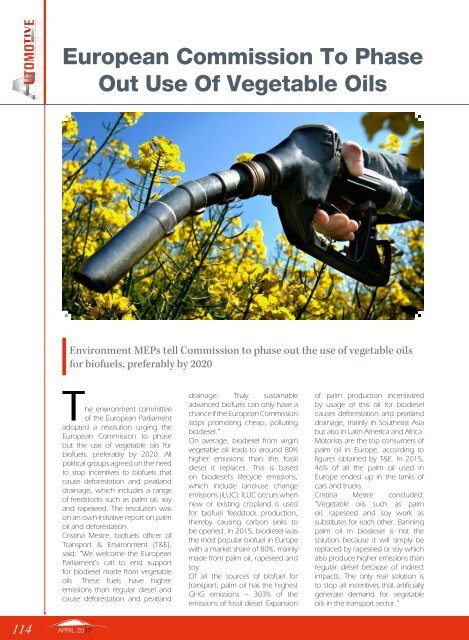Automotive Exports – April 2017
Create successful ePaper yourself
Turn your PDF publications into a flip-book with our unique Google optimized e-Paper software.
Monthly automotive aftermarket magazine<br />
European Commission To Phase<br />
Out Use Of Vegetable Oils<br />
Environment MEPs tell Commission to phase out the use of vegetable oils<br />
for biofuels, preferably by 2020<br />
The environment committee<br />
of the European Parliament<br />
adopted a resolution urging the<br />
European Commission to phase<br />
out the use of vegetable oils for<br />
biofuels, preferably by 2020. All<br />
political groups agreed on the need<br />
to stop incentives to biofuels that<br />
cause deforestation and peatland<br />
drainage, which includes a range<br />
of feedstocks such as palm oil, soy<br />
and rapeseed. The resolution was<br />
on an own-initiative report on palm<br />
oil and deforestation.<br />
Cristina Mestre, biofuels officer of<br />
Transport & Environment (T&E),<br />
said: “We welcome the European<br />
Parliament’s call to end support<br />
for biodiesel made from vegetable<br />
oils. These fuels have higher<br />
emissions than regular diesel and<br />
cause deforestation and peatland<br />
drainage. Truly sustainable<br />
advanced biofuels can only have a<br />
chance if the European Commission<br />
stops promoting cheap, polluting<br />
biodiesel.”<br />
On average, biodiesel from virgin<br />
vegetable oil leads to around 80%<br />
higher emissions than the fossil<br />
diesel it replaces. This is based<br />
on biodiesel’s lifecycle emissions,<br />
which include land-use change<br />
emissions (ILUC). ILUC occurs when<br />
new or existing cropland is used<br />
for biofuel feedstock production,<br />
thereby causing carbon sinks to<br />
be opened. In 2015, biodiesel was<br />
the most popular biofuel in Europe<br />
with a market share of 80%, mainly<br />
made from palm oil, rapeseed and<br />
soy.<br />
Of all the sources of biofuel for<br />
transport, palm oil has the highest<br />
GHG emissions <strong>–</strong> 303% of the<br />
emissions of fossil diesel. Expansion<br />
of palm production incentivized<br />
by usage of this oil for biodiesel<br />
causes deforestation and peatland<br />
drainage, mainly in Southeast Asia<br />
but also in Latin America and Africa.<br />
Motorists are the top consumers of<br />
palm oil in Europe, according to<br />
figures obtained by T&E. In 2015,<br />
46% of all the palm oil used in<br />
Europe ended up in the tanks of<br />
cars and trucks.<br />
Cristina Mestre concluded:<br />
“Vegetable oils such as palm<br />
oil, rapeseed and soy work as<br />
substitutes for each other. Banning<br />
palm oil in biodiesel is not the<br />
solution because it will simply be<br />
replaced by rapeseed or soy which<br />
also produce higher emissions than<br />
regular diesel because of indirect<br />
impacts, The only real solution is<br />
to stop all incentives that artificially<br />
generate demand for vegetable<br />
oils in the transport sector.”<br />
114 APRIL <strong>2017</strong>

















